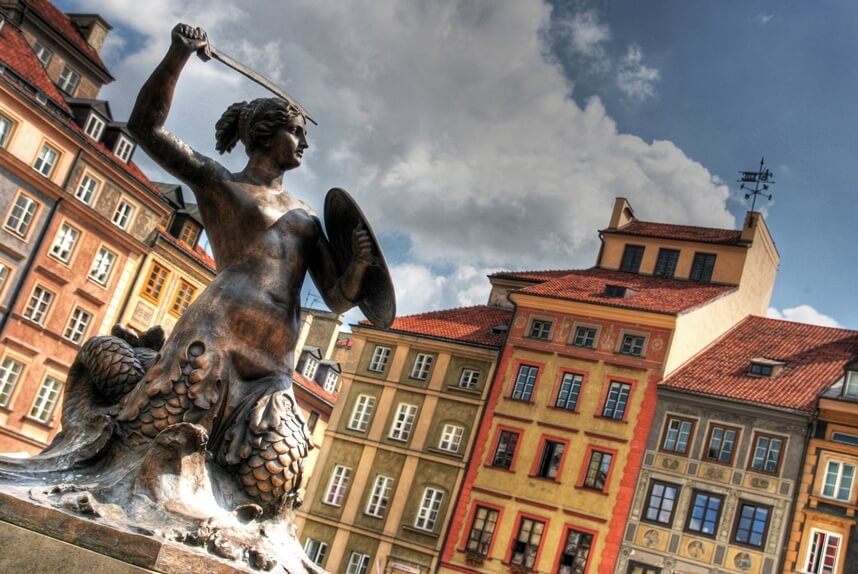Forget the tasteless jokes about cleaners and plumbers; Poland is a growing economic force in Europe. As its buying power increases, so do the opportunities for British exporters.
Ever since it entered the expanded EU, Poland has been a magnet for businesses wanting to get products made cheaply and for the most part reliably. Like China, this part of Eastern Europe has become synonymous with outsourcing, especially with regard to manufactured goods.
But the new wealth that this economic trend has generated, coupled with a growing middle-class, a safe, democratic political background and one-off boosts such as its presidency of the EU in 2011 and co-hosting of 2012’s Euro football tournament means that Poland is turning into a country of monied consumers.
Poland has a population of more than 38 million people. It joined NATO in 1999 and the EU in 2004, when the bloc expanded eastwards. Since the fall of Communism it has implemented a programme of economic liberalism, making it one of the success stories of the post-Soviet era.
Today it is the twenty-first biggest economy in the world, ahead of fellow emerging nations such as Argentina, Egypt, South Africa and Pakistan; and while many European economies are stagnating Poland’s output increased by 3.4 per cent in 2014.
It’s why the United Nations says the country is now the world’s sixth most attractive location for business in the world and why the Organisation for Economic Co-operation and Development says Poland’s public finances are similar to uber-stable countries like Germany and Sweden.
Hot sectors
With Poland’s economic clout on the rise, demand is growing for foreign goods and expertise that will benefit development projects and generally improve quality of life. In-demand sectors include transport and infrastructure, healthcare, computing and IT, as well as military equipment.
A major priority for Poland’s government is security and crime reduction, with live tenders calling for anything from unmanned drone planes to CCTV instillations.
"Poland has a double taxation treaty with Britain with regard to dividends, interest payments, royalties and employment income received by residents of one country doing work in the other."
Poland is also investing in a growing leisure industry and, for example, plans are in place to build one of Europe’s largest year-round amusement parks. UK Trade and Investment (UKTI) says this is throwing up opportunities for foreign designers and project management companies.
Meanwhile, an emerging consumer class is creating demand for luxuries such as high street fashion and electronic goods as well as sporting paraphernalia. It is also the source of a fast-expanding food and drink industry which generates around three per cent of the country’s GDP and supports close to 20,000 businesses.
Doing business in Poland
According to UKTI, the business climate in Poland is improving rapidly but some problems remain surrounding red tape, tax transparency and the Polish judicial system, which sometimes works at a snail’s pace.
Despite boasting a population approaching 40 million, Poland’s urban centres are surprisingly small. Only Warsaw has more than one million inhabitants and the next largest city, Krakow, has only 750,000 people living there. This could pose added complexity to your business’ logistical plans.
Like in the case of many emerging economies, businesses hoping to do business in Poland must appoint a local representative. It is a good idea to approach UKTI to help with this process; it has a list of the best and most trustworthy partners.
Despite Poland’s relative immaturity compared with some economies in the West, its markets are very competitive and launching a new business or exporting a new product will be hard work. It is important to invest in advertising and branding during the launch phase.
Poland’s infrastructure is one of the weakest parts of the country’s economy, with standards of road and rail links below that of Western European democracies. However, investment from the EU, coupled with the jolt provided by the 2012 European Football Championship has helped Poland make big strides forward in this area.
Taxation and the law
The Polish legal system has been pulled into line with EU standards, but it remains complicated and frequent amendments mean corporate law can be hard for outsiders to understand. Because of this, consulting an international accountancy firm and corporate lawyer is a must. Thankfully, most of the big international players have a presence in the country.
Intellectual property rights are strong, comparable to the big European powers and they meet EU standards. Poland is also a member of several international conventions protecting intellectual property rights.
In terms of taxes, Poland has a form of corporation tax, which is lower than in the UK at 19 per cent, and VAT, which is higher than in the UK at 23 per cent. There are two bands of income tax; a lower rate of 18 per cent and a higher rate of 32 per cent.
Poland has a double taxation treaty with Britain with regard to dividends, interest payments, royalties and employment income received by residents of one country doing work in the other, so again it will pay to talk to an accountant before you start exporting.
Poland also has an excise tax which is in-line with EU regulations. This is usually calculated as a percentage of the price of finished goods entering the country.
Business culture
Poland is a modern European country with a good crop of highly skilled and educated young people. The country now has an international outlook and most people in business are fluent in English, while business culture has adapted to suit EU norms.
Unlike in further flung countries, such as China or Japan, there is little difference in Polish business-people’s approach to meetings. According to UKTI, the only significant difference is a level of formality that goes beyond what some British businesses are used to.
Describing how you should approach a meeting in Poland, UKTI recommends: “When meeting someone for the first time in a business environment you should introduce yourself using both first and last name.
“Shaking hands is followed by the exchange of business cards. When addressing senior management in Polish companies in writing you should use ‘Dear Mr Last name’ or ‘Dear Mr President’ rather than ‘Dear First name’. When your relationships with local contacts develop, you can take a less formal approach.”
In general Poland’s impressive post-Communist era growth story, coupled with the legal and fiscal discipline which it exemplifies under EU law, makes Poland an ideal place to sell your goods and services. As always, however, it’s important to seek the advice of local professionals before you jump in.
Thanks for signing up to Minutehack alerts.
Brilliant editorials heading your way soon.
Okay, Thanks!

